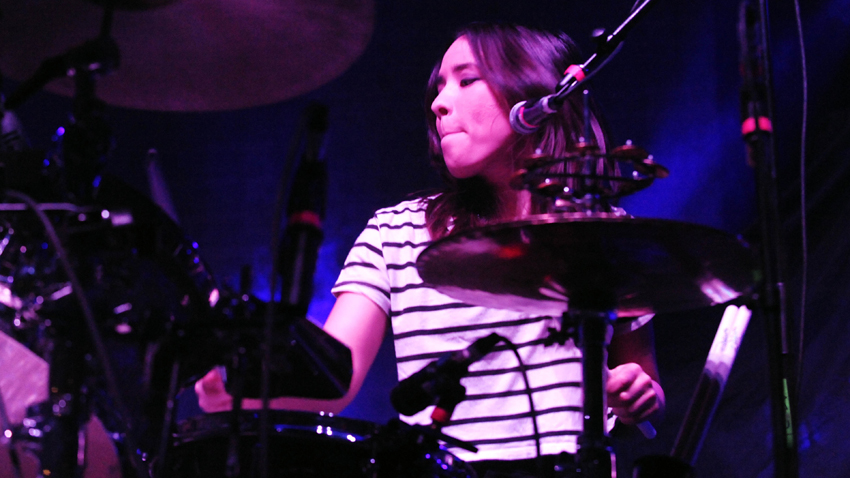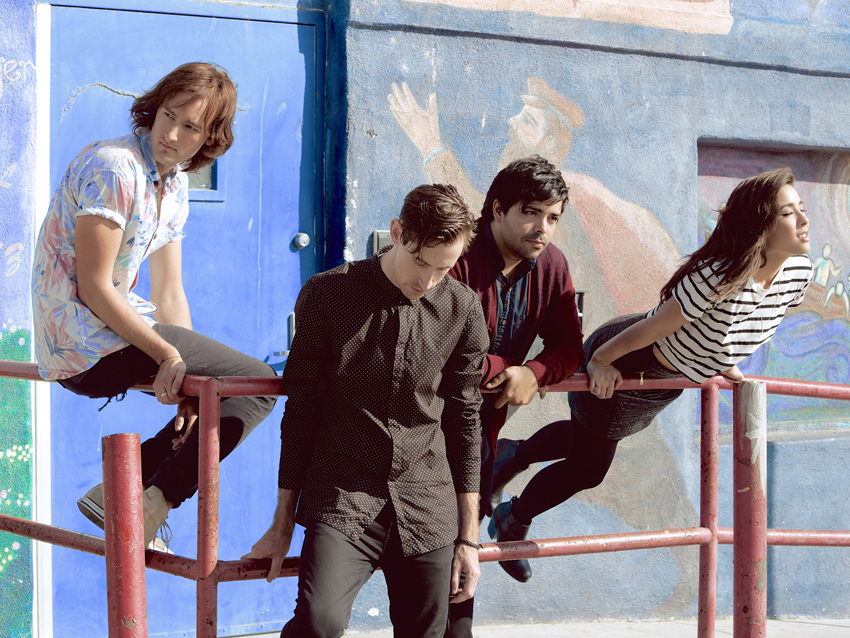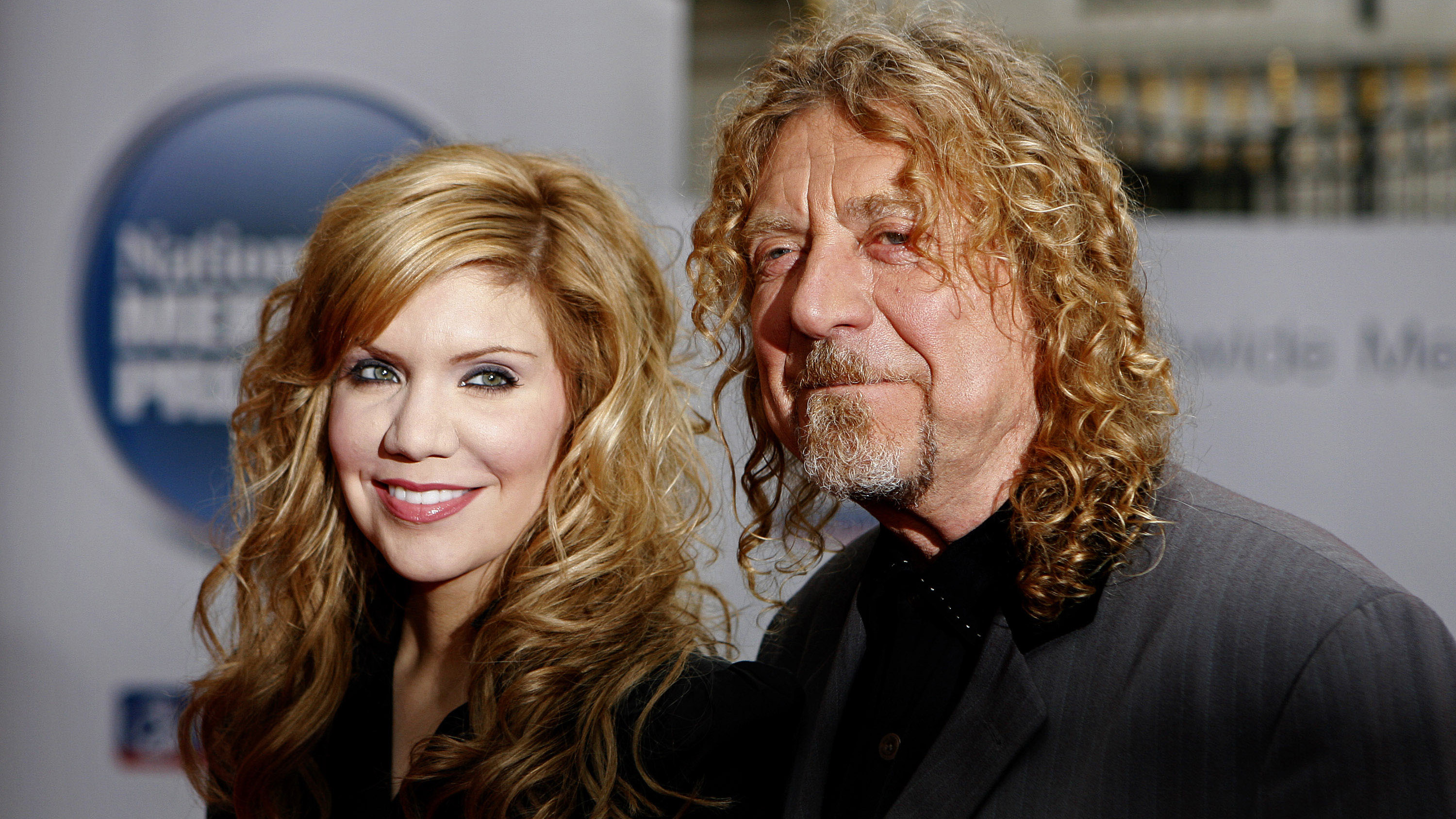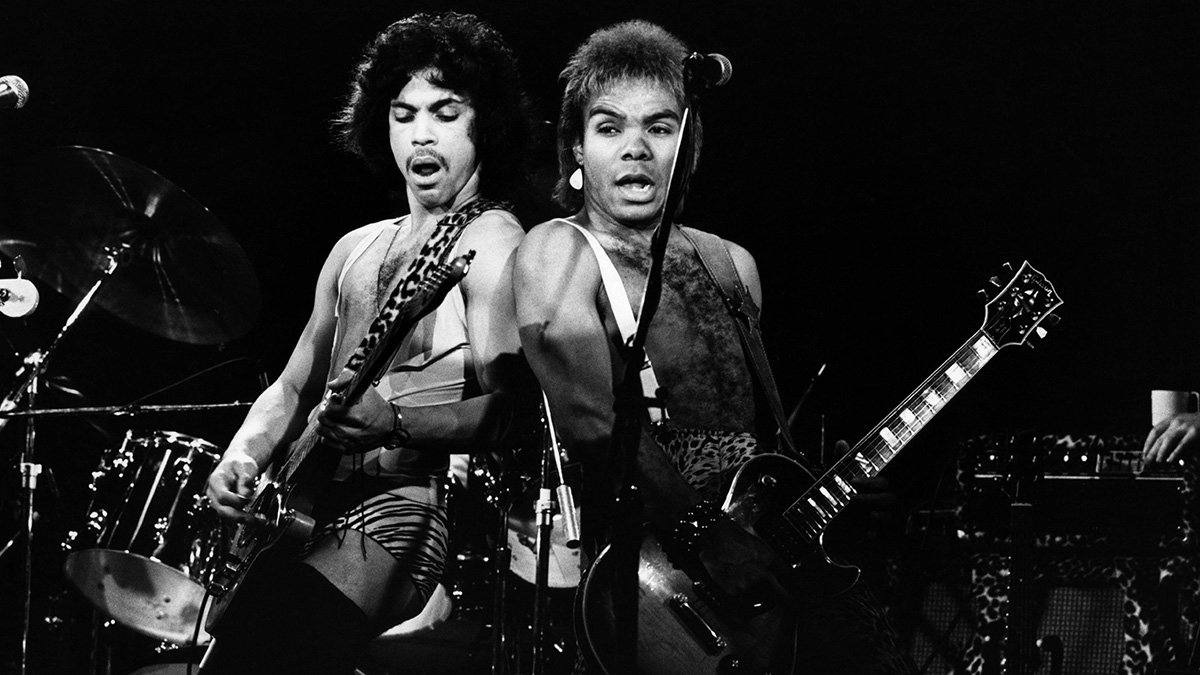
Maya Tuttle doesn't think she's a pioneer, but as drummer and co-vocalist for the fast-rising Orange County quartet The Colourist, she does admit to being a little different. "I feel a little alone sometimes," she says. "There's not a lot of female drummers out there. There still aren't a lot of women in indie rock in general. Even in 2014, it's pretty male dominated."
The next wave of rock could look a lot different, however, and if we one day see a slew female drummers keeping the beat, they very well might cite Tuttle as their inspiration. "I think a lot of girls do want to do this," she says. "I meet so many girls during our shows - they come up to me and say, 'Oh, I wish I was playing drums in a band. And I encourage them. The more women we have playing instruments, the better."
Tuttle's clever, potent drumming is just one of the myriad charms of The Colourist's self-titled debut album (out March 25th on Republic Records), a smart, superbly paced collection of driving, uplifting, ethereal pop-rock (although the band has their own descriptors - more about that later). The combination of Tuttle's velvety voice wrapped around guitarist and co-singer Adam Castilla's biting tenor adds considerable dimension and emotional heft to spunky winners like Little Games and We Won't Go Home, cuts so strong they would sound memorable even if they were instrumentals.
Tuttle sat down with MusicRadar recently to talk drums and drumming, crashing the boy's club and how life on the road compares to her rock-star dreams.
I understand that Karen Carpenter made a big impression on you as a kid.
"She did, absolutely. My dad was really into them. I saw an archived clip of them on TV, and I was like, 'Oh, my God, the lead singer is also the drummer!' That was so inspiring to me. Karen Carpenter died before I was even born, but I got into watching her. It's cool to go down the YouTube rabbit hole and dig out all these videos. You see her doing the marching band thing on this TV special, and there's this another clip where she's running around from kit to kit. And she sang at the same time as she played, which blows my mind. We kind of do a similar thing, I guess.
"There's other female drummers who I look up to today: Cindy Blackman Santana, Hannah Ford, Carla Azar from Autolux. It's a small club, but I'm hoping it gets bigger and bigger."
Get the MusicRadar Newsletter
Want all the hottest music and gear news, reviews, deals, features and more, direct to your inbox? Sign up here.
Growing up, what male drummers did you look to?
"When I did high school jazz band, I started looking into Steve Gadd because I had his sticks. They were these black sticks, which were pretty cool. I tried to learn some of his beats, these shuffles and sort of bossa nova-like grooves. They helped get your limbs good and loose. He was great on the more technical side of drumming. I also got into Travis Barker from Blink-182. I liked the wild, fast and crazy side to his playing."

The Colourist: (left to right) Kollin Johannsen (guitar), Justin Wager (bass), Adam Castilla and Tuttle.
I'm curious - did you encounter any sort of sexism when you were coming up: "Oh, girls can't drum," that kind of thing? Or did some people think you were super-cool because you're a female drummer?
"I got a mixture of both. I guess the hardest thing was when I was starting out. There weren't any girls in the school band, so I had to convince my parents to let me do something that was different. It's intimidating when you don't know how you're going to be looked at.
"I've experienced some sexism. I remember this time when Adam and I were doing one of our first gigs - this was in another band, Paper Thin Walls. I walked into a club with my drums, and the sound guy looked at me, then he looked at Adam like,'Wow, nice roadie you got there.' People would assume that I was just somebody's girlfriend or whatever. I'd get that pretty often, actually. Or there have been times when the band might be meeting people, and somebody won't shake my hand - again, I must be 'the girlfriend.'
"It can go either way. I get ignored because I'm a girl, but sometimes I get too much attention. Sometimes I get attention on stage because I'm considered a novelty, and of course, that's the last thing I want. Just take me who I am - a musician in a band."
Being able to sing and play drums is pretty hard to pull off - not many drummers can do it. When did you realize you had an affinity for both talents?
"It is really hard, absolutely. Neither Adam nor I sang in Paper Thin Walls, but when we stuck together and started to form The Colourist, we couldn't find a singer - nobody gelled with us. So it came about out of necessity for us to start singing. I used to sing in the shower, but doing it in front of people was scary at first. We just started experimenting.
"As a singer, I feel like the drums are my security blanket. They help me sing, in a way; I feel as though I can be comfortable, even vulnerable - I've got this shield. It's important to me to have both things going on at the same time, the singing and drumming, but it's hard. Especially in the beginning, when I would try to sing something I'd written and play it at the same time, it's like you're trying to put together a puzzle and the pieces don't want to fit. You really have to relearn parts, and you have to be very aware of putting your foot down on a beat and where to sing a certain note. I'm still learning."
Did you and Adam look to other bands with dual male and female singers - Fleetwood Mac, say?
"Not consciously. It was sort of natural, although we're definitely fans of bands with the guy/girl dynamic, whether it's Fleetwood Mac or Of Monsters And Men. We just discovered that we loved singing, and we loved how our voices blended."
You've described your music as "math pop" and "majestic rock." The song Little Games sounds like both terms - it's got a classic, feel-good New Order vibe.
"Oh, thank you very much. That's a question we always have trouble with - 'How would you describe your sound?' I think Little Games fits the way we see ourselves; it's upbeat and high-energy. It's interesting, though, because a lot of what we sing about on this record is very dark. There's a cool dichotomy that we've established, a neat push-and-pull between the lyrics and music. It all came from us dreaming a sound. We do like it to be a mix of things but one that's hopeful in the end."
Let's talk about your drums. You play a C&C kit?
"Yeah, I play a four-piece kit: rack tom, floor tom, a 22 by 20 kick. The snare I use live is a Pearl Vintage Sensitone - it used to be the Steve Ferrone snare. I put an extra head on it to give it a more compressed sound. It sounds almost like a sample; it's got less ring to it.
"Before the C&C kit, I had a beginner set that my mom bought me when I was 12, a Tama Rockstar. I had it for a long time, and it was great. I got the C&C kit because I wanted something more adult sounding. [Laughs] I was starting to pay attention to what drummers in other bands were using. I'd see the Flaming Lips and Arcade Fire and My Morning Jacket, and I noticed that their drummers played C&C kits. I loved the way the bands sounded, so I decided to give C&C a try. It was great going on their website and looking at all the different drums.
"Our producer, Carlos De La Garza, loves the kit, but he told me that I shouldn't take it on the road anymore because it can get ruined. I'm thinking that I might retire it from traveling soon. Maybe I'll look into something else for touring."
You're young enough that I can still ask you this: How does the dream of being a touring musician compare with the dream you might have had several years ago?
"That's a really great question because it's something that's been on my mind lately. Parts of it are exactly what I imagined, and other parts are so far from that I envisioned they might be. The perception of touring is that you're partying constantly and everybody adores you wherever you go; it's just fun 24 hours a day.
"It can be that a bit, but it's really a ton of work. I never could have imagined how much work touring is and how exhausting it is. If you do choose to party, you're gonna pay for it the next day. You'll be tired and not able to perform well. So you have to pay attention to your health and your sleep; you have to try to eat well and all that stuff. You have to take care of yourself even more than you do when you're at home.
"On the other hand, it's no problem because this is what we want to do, and it's a dream come true to be able to able to make music for a living. It doesn't seem like work - well, it is, but it's not like coming home from a job you hate. Our job is so satisfying. We get to meet people who have been touched by our music; we get to travel and see all these cities. It's really satisfying - I shouldn't even put a 'but' in there."
You can pre-order The Colourist's self-titled debut album at iTunes.
Joe is a freelance journalist who has, over the past few decades, interviewed hundreds of guitarists for Guitar World, Guitar Player, MusicRadar and Classic Rock. He is also a former editor of Guitar World, contributing writer for Guitar Aficionado and VP of A&R for Island Records. He’s an enthusiastic guitarist, but he’s nowhere near the likes of the people he interviews. Surprisingly, his skills are more suited to the drums. If you need a drummer for your Beatles tribute band, look him up.
Zak Starkey is back in The Who. “I take responsibility for some of the confusion… Zak made a few mistakes and he has apologised”, says Pete Townshend
“I oversaw every element - not just the music and the lyrics and the melodies and the production, but also the merch and the fan clubs and everything”: Mike Portnoy talks about his years away from Dream Theater










